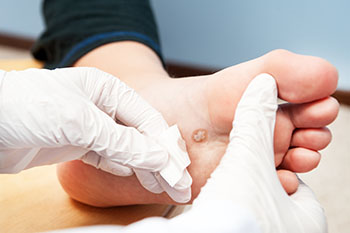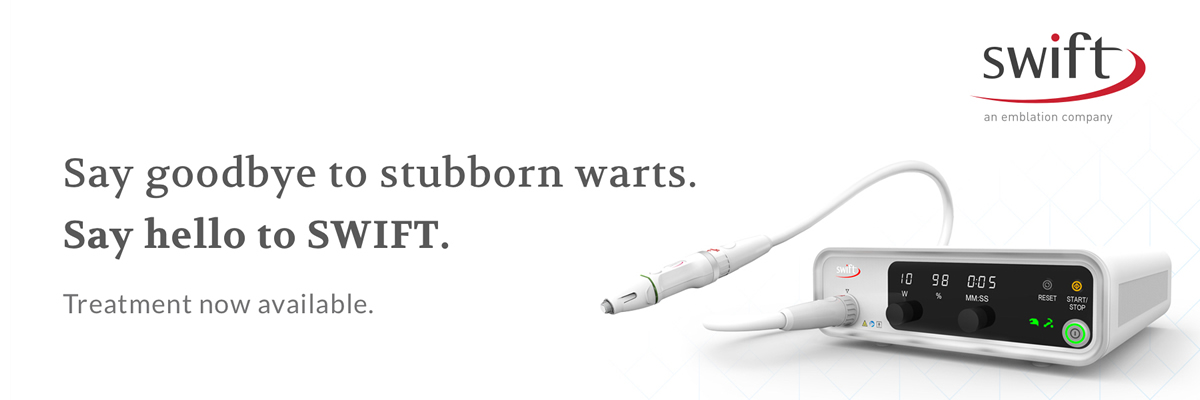
Plantar warts develop on the plantar areas of the feet, namely the soles or the bottom of the feet that bear weight. Sometimes plantar warts can grow in a cluster, which is referred to as mosaic warts. Though they are generally harmless, plantar warts can be very painful and can require professional help.
Plantar warts can develop when a virus enters through the skin, often by a cut or scrape. They’re contagious and typically spread in locations such as public swimming pools, communal showers, as well as your shower at home. Gym facilities and yoga studios may also be more susceptible to plantar wart breakouts due to their publicly shared spaces. Plantar warts are commonly found among children and those with weaker immune systems.
To tell if you have plantar warts, you should check the soles of your feet for bumpy growths. Sometimes these growths may come with a tiny black dot in the center. You may also have plantar warts if you experience pain when walking or standing up. Because plantar warts are easily confused with other foot conditions like corns or calluses, it’s important you seek professional help for proper treatment.
Since plantar warts are caused by HPV, or human papillomavirus, and is very contagious, it’s important that you take certain measures to help avoid getting this condition. To start, you can do this by washing your hands frequently and drying them completely, since warts thrive with moisture. You should also wear shoes in public spaces like swimming pools and locker rooms. It’s important to avoid touching someone else’s wart or picking at your own warts as well. Along with not picking at your warts, it’s imperative that you refrain from shaving, brushing, or clipping areas that have warts.
If you’d like more information about plantar warts and how they’re treated, we recommend you speak with a podiatrist for professional guidance and care.

Are you tired of dealing with pesky warts? We at Farah Podiatry Associates are very excited to announce that we have a brand new and effective treatment for surface based skin lesions, primarily warts.
Plantar warts; a common and stubborn Viral Infection
“Plantar” means “Of the sole” in Latin. Unlike other types of warts, plantar warts are typically quite painful as the pressure from walking and standing forces them to grow into your skin. Like all warts, Plantar warts are caused by the human papillomavirus (HPV) virus, specifically types 1, 2, 4, 60, and 63. Underneath the skin, the wart can have finger-like roots that reach down and grow, making them very difficult to treat effectively from the surface.
What is Swift?
Swift is a cutting edge, FDA Cleared technology that has proven to be highly effective in the removal of plantar warts. It delivers low dose microwave energy through a specialized probe that targets and effectively treats the underlying HPV virus by stimulating a natural immune response in the body. We like to say that we’re addressing the root cause; not the symptom.
What to Expect
Swift protocol involves between 3 and 4 treatments, spaced 4 weeks apart; aligning with the body’s natural immune cycle. Each treatment lasts only 5-10 minutes and is what we call a “sock off - sock on” treatment: Limited debridement, no breaking of the skin, no bandages. No home treatment is required between treatments and patients are able to resume daily activities immediately post treatment.
How effective is Swift?
The Swift technology treatment feels similar to the pain of a small scratch or injection, lasting only a few seconds before immediately subsiding. Some may experience some soreness after the treatment, but not anything strong enough to impair normal day-to-day activities.
Does it hurt?
While pain is variable and patient/lesion specific, most patients typically feel some level of discomfort as infected tissue temperatures are rapidly elevated over a 2 second dose of energy. The pain immediately subsides following cessation of energy delivery and there is very limited post procedural pain, in fact some report an immediate reduction in pain levels. All patients are about to continue on with day-to-day activities immediately following treatment.
When you should come to see us
It’s important to visit a podiatrist if you suspect or feel that you have a plantar wart and are seeking removal. The longer you wait to seek treatment, the more likely the wart is to persist. Here are some common symptoms to look out for:
What to do Next?
If you would like to (a) get rid of your warts and/or (b) explore Swift Treatment, please call our office at (734) 675-7777.